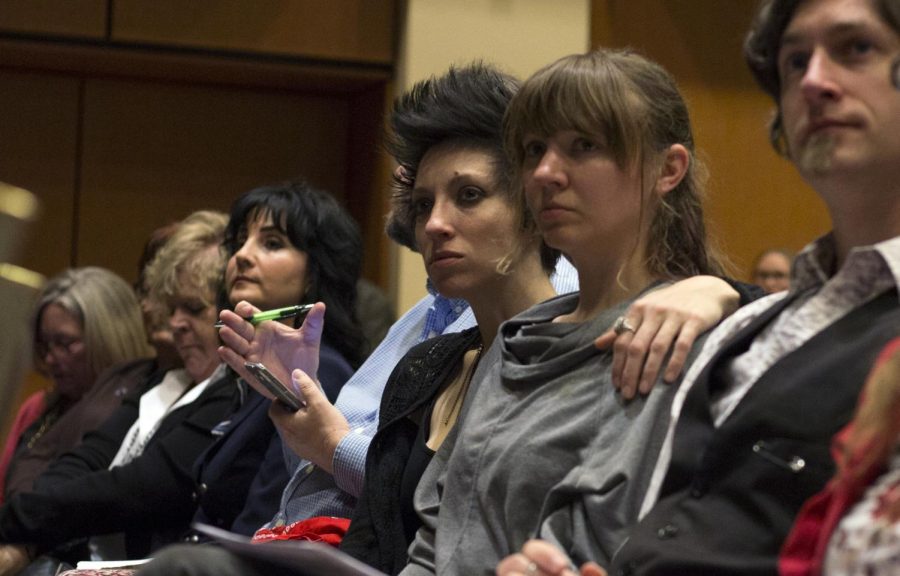May 4 Commemoration addresses 47 years of hate and social issues
Audience members Angie Haze and Meryl Hornyak listen to speakers at the 47th annual May 4th Commemoration in the Kent State University Ballroom on Thursday, May 4, 2017.
May 4, 2017
At the 47th annual May 4 commemoration, keynote speaker Lecia Brooks addressed the increase in hateful rhetoric, hate groups and violence that has increased over the last few years.
“In addition to anti-semitism being on the rise islamophobia is on the rise and it has been. Islamophobia is worse today than it was post 9/11,” Brookes said.
The May 4 Task Force invited Brooks, the outreach director of the Southern Poverty Law Center, to speak at this year’s ceremony.
May 4 survivor speaks out about commemoration from KentWired.com on Vimeo.
The Southern Poverty Law Center is a nonprofit legal organization specializing in civil rights. SPLC fights for equality for all and seeks justice against bigotry, according to its website.
SPLC also keeps count of hate groups across the country, Brooks said the number of anti-muslim hate groups on its list has tripled from 2015 to 2016.
“We should learn from the past,” Brooks said. “What I feel that we need is a return to an old national revolution, also known as a civil rights movement.”
Brooks calls for activism, to not just sit idly by and watch the world happen.
“Nothing is going to be changed unless we demand it be changed,” Brooks said.
Ben Smith, a senior applied conflict management major and member of the May Task Force, is involved in planning May 4 events.
“The goals are first and foremost in remembrance of the victims, but at the same time to use it as a platform to discuss current issues,” Smith said.
Brandon Mallon, a junior history major and president of the May 4 Task Force, said he thought the commemoration went very well.
“We had powerful speakers that the audience was able to connect to,” Mallon said.
Other speakers joined Brooks on the stage: Daniel Miller, Evie Morris, Mark Webster, Mim Jackson, Jim Huebner, Zach Friedhof, Pat LaMarche and Provost Todd Diacon, who opened the commemoration.
Diacon said one of the first responses to May 4 included the creation of the Center for Peaceful Change in 1971.
“Today I am very proud to announce that the centers successor — the Center for Applied Conflict Management — has been elevated in its standing to a separate school within the college of arts and sciences,” Diacon said.
Tori Swarm, an alumna who majored in applied conflict management, said she continues to come to the commemoration because it still ties into her life. She said there should be more love in the world and less hate.
Despite this progress, Swarm believes there are still many challenges that we face.
Alan “Tré” Dufner, a senior philosophy major, said the students need to work towards changing the hateful rhetoric prevalent in society.
“A big thing we can do is recognize and try to self-criticize how we interact with other people and just pay attention to what we do,” Dufner said. “That can be hard especially because we haven’t experienced people who would take that as negative or don’t understand how that can be taken as negative, but being open to that is at least a first step.”
However, this hateful rhetoric, which is becoming more common in society, is not what May 4 is about, said Harold Greenberg.
Greenberg, who attended the journalism graduate school in 1970, thinks the ceremonies have strayed too far from what May 4 should be about: remembering the students who were killed.
“I feel that the whole day has been bastardized,” Greenberg said. “These things fling so far from the reality of the day, and that’s why I can’t stand there and listen to all the speeches.”
Greenberg said the purpose of May 4 is to honor students, but many of the speeches are used to discuss current social and political issues
“You cannot take and extrapolate and make what things are going on today … necessarily say ‘the same things happening’ because they’re not. Some of the things might be the same, but not everything is,” Greenberg said.
Addie Gall is the social sciences reporter, contact her at [email protected].
Anna Huntsman is TV2 reporter, contact her at [email protected].













